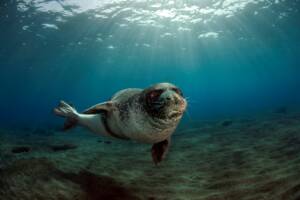The Mediterranean Monk Seal, the most endangered marine mammal in Europe and once a frequent sight in all Mediterranean countries and along the African coast and Macaronesia, disappeared almost completely from the face of the Earth. However, thanks to various international organisations and important awareness-raising work, it’s now improving its chances of survival. Thus, from this year, The Loro Parque Foundation has collaborated by co-financing the Mediterranean Monk Seal conservation programme in Madeira through the development of a monitoring system of its conservation status (LIFE13 NAT/ES/00974 ), via the CBD Hábitat Foundation and the Instituto das Florestas e Conservação da Natureza de Madeira.
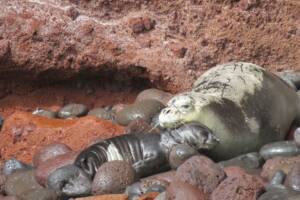
Mothers and offspring Mediterranean monk seal, at the entrance of a cave, in Desertas Islands. Source: Instituto das Florestas e Conservação da Natureza da Madeira.
It has now almost completely disappeared from all its original locations and its population has been reduced to less than 700 individuals fragmented into three or four sub-populations, making it one of the most endangered seals on the planet. Accidental death due to fishing gear remains the greatest threat to the survival of this species, which also suffered a severe blow in 1997 when 200 individuals died in the Cabo Blanco colony (Western Sahara) from a red tide.
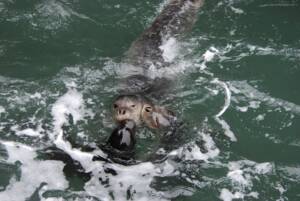
Mediterranean monk seals in Madaira. Source: Instituto das Florestas e Conservação da Natureza da Madeira.
The project that The Loro Parque Foundation promotes focuses on a small population (estimated at about 25 specimens) and is located on the Islas Desertas, although it has been proven that from there they move around the whole island of Madeira. The director of the Monk Seal Conservation Programme of the CBD Habitat Foundation Pablo Fernández de Larrinoa considers that “public-private cooperation in the conservation of this species is what will save it from extinction, both at the level of funding for community institutions and the countries involved, as well as private companies with sensitivity to the loss of global biodiversity on the planet”. It also applies “at the level of the actual execution of conservation work, where citizen participation in a coordinated and targeted manner is increasingly important to complement and help professionals,” he said.
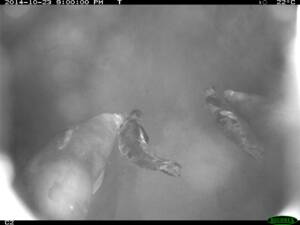
Mothers and offspring Mediterranean monk seal, with a few days old, inside a cave, observed through a surveillance camera. Source: Instituto das Florestas e Conservação da Natureza da Madeira.
The Loro Parque Foundation’s contribution is to collaborate in a project to tag seals with bracelets equipped with GPS receivers, which make it possible to track the specimens and determine their areas of critical habitat, and which will allow the Madeira authorities to establish more effective protection measures. This monitoring system will also be useful to determine the feeding depths and regular habitat areas of the specimens and determine their degree of overlap with fishing activities.
The experts also point out that it must be borne in mind that the seal population of Madeira is absolutely isolated in the archipelago and there is no current possibility of intermingling. Furthermore, due to human pressure on their optimal habitat, the Mediterranean Monk Seal lives in caves with rocky beaches and steep coastlines which are difficult to access. This type of habitat creates serious problems for the conservation and maintenance of the GPS bracelets, that poses continuing challenges for the field team.
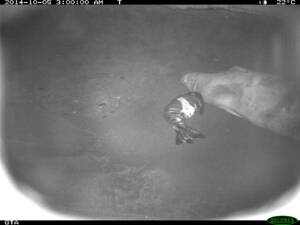
Mother and offspring Monachus monachus , with few days old, inside a cave, observed through a surveillance camera. Source: Instituto das Florestas e Conservação da Natureza da Madeira.
Another aspect of the project is the monitoring of caves by photo-trapping, to establish which ones are used by the seals to breed, and thus establish protection measures. These caves are also subjected to extreme conditions of pressure due to the strength of the waves, which together with the splashes of seawater also create new challenges for photo-trapping technology.
Although all the efforts so far are bearing fruit, in the coming years we will have to maintain our commitment and verify that the trend of population increase continues in order to be optimistic about the recovery of the species. Therefore, the International Union for the Conservation of Nature (IUCN) plans to carry out a re-evaluation of the degree of threat to the species in 2020. These assessments are particularly important in the context of global climate change, the effects of which could seriously affect threatened species with small and fragmented populations.

